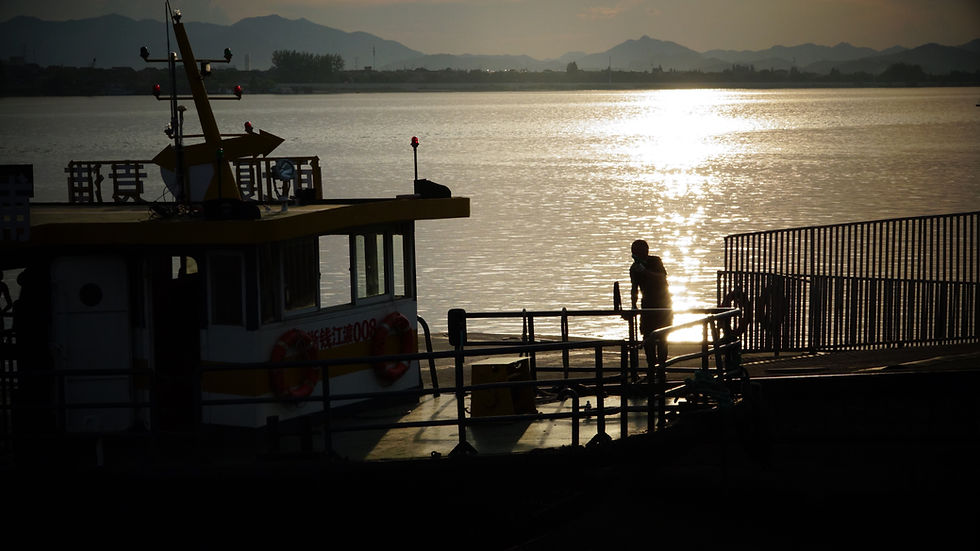The Last Guardian of Zhejiang’s First Pier: Chen and the Vanished Ferry Era
- a17794542693
- Nov 4, 2025
- 3 min read
Updated: Nov 23, 2025
Hangzhou, Nanxing Bridge — Interview conducted June 2025
The site of the “Zhejiang First Pier” near Hangzhou’s Nanxing Bridge no longer exists. My grandfather, who worked for over two decades as a crew member at the Qiantang River Shipping Company’s passenger transport department, often spoke of this place. His former colleague, 69-year-old Chen, still lives nearby. I recently met him for an interview by the riverbank.
As we strolled along the water, his gaze drifted toward the center of the river. He told me that even now, he sometimes imagines he can hear the familiar sound of the ferry whistle from over thirty years ago.
The Heyday of Passenger Transport

Photographs retrieved from the Hangzhou Municipal Archives
“Back then, at 5 a.m. every morning, the whistle would sound, and the ferry across the river would answer,” Chen said, his voice thin against the river breeze. “The pier was always packed—people pushing bicycles, carrying baskets of vegetables, hurrying to work… The queue could stretch for three kilometers.”
In the 1970s, a young Chen joined the Qiantang River Shipping Company’s passenger transport department, beginning his lifelong connection with the river. He started as a pilot on passenger boats from Hangzhou to Tonglu and later specialized in operating the Nanxing Bridge ferry route. Those were the golden years of river transport. The passenger division operated 7 routes and 28 vessels, carrying nearly 40 million passengers annually.
“During peak hours, we’d depart as soon as the boat was full, every 10 minutes or so, making twenty to thirty trips a day,” Chen recalled. The ferries evolved from wooden towed barges to iron-hulled ships capable of carrying a thousand passengers. “We called it ‘cutting off the tail’—removing the powerless towed barges so the ferry could operate independently.”
However, the tides of history, much like the Qiantang River’s currents, inevitably shift. In the 1990s, Hangzhou began constructing large-scale cross-river bridges. One after another, bridges like the Xixing Bridge, Fuxing Bridge, and Qiantang River Bridge spanned the river. “As bridges advanced, ferries retreated” became an irreversible trend.
“Day by day, we watched the crowds at the pier grow thinner,” Chen said. “The lively scenes of queues waiting for ferries slowly faded into memories.”
Bridges Advance, Ferries Retreat
In 1998, the Zhejiang First Pier, which had operated for over a century, was officially decommissioned. At 42, Chen found himself out of work—a sharp turn for someone who had spent nearly two and a half decades on the river.
“For people like us, who spent our whole lives steering boats, there wasn’t much else we knew how to do,” Chen said with a bitter smile. Fortunately, he later found work piloting tourist boats on the Fuchun River and the Grand Canal, a job he continued until his retirement at 60. “Being able to stay on the water made me luckier than many of my colleagues.”
His colleagues were far less fortunate. Some transitioned to jobs as security guards, others repaired cars, and some became shop assistants—all unstable, low-income work. “After half a lifetime on the ferries, suddenly having to start over was hard to swallow,” Chen said. Some of his former colleagues, unable to adapt to life on land, fell ill not long after.
Now, standing on the abandoned pier, Chen pointed to the cargo ships navigating the river. “Shipping today is mostly freight. Those of us who operated passenger boats have been left behind by the times.”
The river wind rustled his graying hair. In the distance, traffic streamed endlessly across the Fuxing Bridge. Against the vast expanse of the river, Chen’s figure seemed small—a final witness to the Zhejiang First Pier, a guardian of a bygone era.
“Sometimes, in my dreams, I can still hear the ferry whistle,” he murmured softly.
And I thought to myself: it isn’t just the sound of a boat—it’s the sound of a time.

![Poem: "The Boatmen Community [A Neo-River Colony]"](https://static.wixstatic.com/media/929abe_e0b364e18dd743ce8092b77179359ff5~mv2.jpg/v1/fill/w_980,h_551,al_c,q_85,usm_0.66_1.00_0.01,enc_avif,quality_auto/929abe_e0b364e18dd743ce8092b77179359ff5~mv2.jpg)

Comments